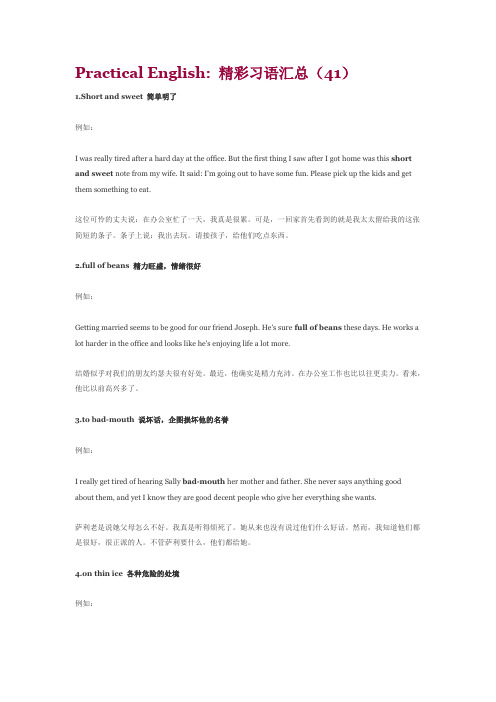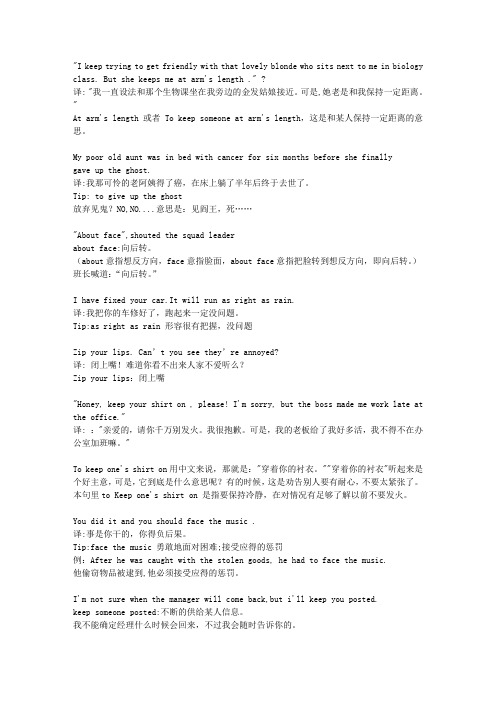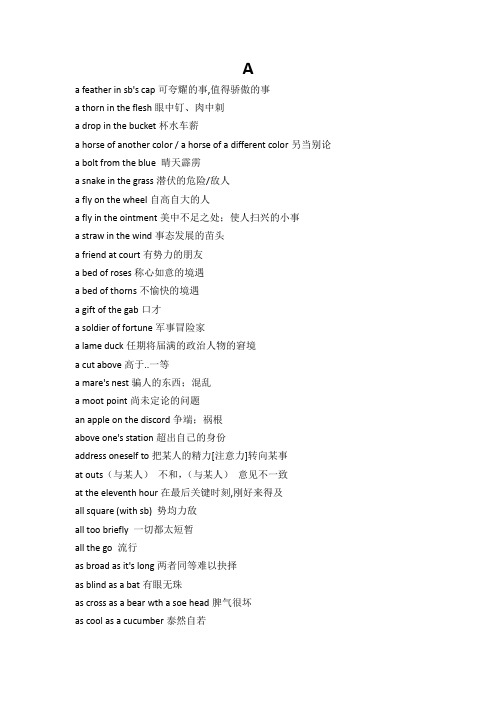习语及其特点_英文_
- 格式:pdf
- 大小:180.50 KB
- 文档页数:4

Practical English: 精彩习语汇总(41)1.Short and sweet 简单明了例如:I was really tired after a hard day at the office. But the first thing I saw after I got home was this short and sweet note from my wife. It said: I'm going out to have some fun. Please pick up the kids and get them something to eat.这位可怜的丈夫说:在办公室忙了一天,我真是很累。
可是,一回家首先看到的就是我太太留给我的这张简短的条子。
条子上说:我出去玩。
请接孩子,给他们吃点东西。
2.full of beans 精力旺盛,情绪很好例如:Getting married seems to be good for our friend Joseph. He's sure full of beans these days. He works a lot harder in the office and looks like he's enjoying life a lot more.结婚似乎对我们的朋友约瑟夫很有好处。
最近,他确实是精力充沛。
在办公室工作也比以往更卖力。
看来,他比以前高兴多了。
3.to bad-mouth 说坏话,企图损坏他的名誉例如:I really get tired of hearing Sally bad-mouth her mother and father. She never says anything good about them, and yet I know they are good decent people who give her everything she wants.萨利老是说她父母怎么不好。

"I keep trying to get friendly with that lovely blonde who sits next to me in biology class. But she keeps me at arm's length ." ?译: "我一直设法和那个生物课坐在我旁边的金发姑娘接近。
可是,她老是和我保持一定距离。
"At arm's length 或者To keep someone at arm's length,这是和某人保持一定距离的意思。
My poor old aunt was in bed with cancer for six months before she finallygave up the ghost.译:我那可怜的老阿姨得了癌,在床上躺了半年后终于去世了。
Tip: to give up the ghost放弃见鬼?NO,NO....意思是:见阎王,死……"About face",shouted the squad leaderabout face:向后转。
(about意指想反方向,face意指脸面,about face意指把脸转到想反方向,即向后转。
)班长喊道:“向后转。
”I have fixed your car.It will run as right as rain.译:我把你的车修好了,跑起来一定没问题。
Tip:as right as rain 形容很有把握,没问题Zip your lips. Can’t you see they’re annoyed?译: 闭上嘴!难道你看不出来人家不爱听么?Zip your lips:闭上嘴"Honey, keep your shirt on , please! I'm sorry, but the boss made me work late at the office."译: :"亲爱的,请你千万别发火。

学习常见的习惯用语的英文表达在日常英语学习和交流中,习惯用语是非常常见且有用的表达方式。
熟练使用习惯用语可以使我们的英语表达更加流利自然,增加口语表达的地道性。
因此,学习常见的习惯用语的英文表达对于提高英语能力至关重要。
本文将为您介绍一些常见的习惯用语及其英文表达方式。
一、问候与交流1. 常见的问候方式在日常生活中,我们经常会使用一些问候语来表示友好和尊重。
以下是一些常见的问候语及其英文表达方式:- 你好:Hello / Hi- 早上好:Good morning- 下午好:Good afternoon- 晚上好:Good evening- 再见:Goodbye / Bye- 谢谢:Thank you2. 询问别人的近况在与他人交流时,我们通常会询问对方的近况。
以下是一些常见的询问语及其英文表达方式:- 最近怎么样?:How have you been? / How are you doing these days?- 你好吗?:How are you?- 有什么新鲜事吗?:What's new?二、描述与评论1. 描述人或事物在英语表达中,我们经常需要使用一些习惯用语来描述人或事物。
以下是一些常见的描述习语及其英文表达方式:- 外貌:as pretty as a picture(漂亮如画)- 性格:a piece of cake(温和、容易相处的)- 聪明:as sharp as a tack(聪明如锋利的图钉)- 快乐:as happy as a clam(非常快乐)2. 表示同意或不同意在交流中,表达自己的观点时,我们通常会使用一些习惯用语来表示同意或不同意。
以下是一些常见的表示同意或不同意的习语及其英文表达方式:- 同意:I couldn't agree more(我非常同意)- 不同意:I'm afraid I disagree(恐怕我不同意)三、日常生活1. 饮食方面习语在描述食物或饮食方面的习语中,我们可以使用一些常见的习语表达方式,如:- 一切顺利:smooth sailing(形容事情进行得很顺利)- 吃早饭:have breakfast(吃早饭的意思)- 慢慢吃:take your time(慢慢吃饭)2. 购物方面习语在购物过程中,我们通常也会使用一些习语来表达意愿或与商家进行交流。

精彩习语汇总1.dry run 排练;排演A: We're going to practice a dry run of the performance tonight.B: Where? In the school auditorium?A: 今晚我们将进行彩排。
B: 在哪儿?在学校礼堂吗?2.steal the show(尤指配角或原处于次要地位的人)大出风头A: How was your last night's performance.B: The warm-up band steal the show from us.A: 你们昨晚的演出如何?B: 开场前为演出制造气氛的乐队抢了我们的风头。
3.buck for 千方百计谋求;拼命争取A: I think Richard is bucking for a promotion.B: You can say that again.A: 我看理查德正在千方百计地想要升职。
B: 你说得一点不错。
4.shell game 欺骗把戏A: They are playing shell games.B: I'd rather believe them.A: 他们在骗人B: 我宁愿相信他们。
5.have ( oneself) a ball 狂欢,作乐A: Have a ball on your trip.B: Thanks.A: 祝你旅途愉快。
B: 谢了。
6.block up 垫高A: Not the engine, I think it's the wheels.B: Maybe we have to block up the rear wheel. Fortunately we've got a spare wheel.A: 不是发动机的毛病,我觉得是轮胎。
B: 我们得把后轮垫起来,好歹我们有个备用胎。
7.take a licking 遭受挫折,遭受惨败A: Our team really took a licking in last night's game.B: Don't lose heart.A: 我们队昨晚比赛输了。


Aa feather in sb's cap可夸耀的事,值得骄傲的事a thorn in the flesh眼中钉、肉中刺a drop in the bucket杯水车薪a horse of another color / a horse of a different color另当别论a bolt from the blue 晴天霹雳a snake in the grass潜伏的危险/敌人a fly on the wheel自高自大的人a fly in the ointment美中不足之处;使人扫兴的小事a straw in the wind事态发展的苗头a friend at court有势力的朋友a bed of roses称心如意的境遇a bed of thorns不愉快的境遇a gift of the gab口才a soldier of fortune军事冒险家a lame duck任期将届满的政治人物的窘境a cut above高于..一等a mare's nest骗人的东西;混乱a moot point尚未定论的问题an apple on the discord争端;祸根above one's station超出自己的身份address oneself to把某人的精力[注意力]转向某事at outs(与某人)不和,(与某人)意见不一致at the eleventh hour在最后关键时刻,刚好来得及all square (with sb) 势均力敌all too briefly 一切都太短暂all the go 流行as broad as it's long两者同等难以抉择as blind as a bat有眼无珠as cross as a bear wth a soe head脾气很坏as cool as a cucumber泰然自若as easy as rolling off a log极其容易as large as life与原物一般大小as meek as a lamb非常温顺as stiff as a poker生硬,刻板as slippery as an eel油滑的;不可靠的Achilles' heel致命要害✧ A rolling stone gathers no moss.—滚石不生苔,转业不聚财✧ A stitch in time saves nine.--小洞不补,大洞吃苦。
Proverbs1. A bird in the hand is worth two in the bush.一鸟在手,胜于二鸟在林His father thinks that a bird in the hand is worth two in the bush.他父亲认为得到手的东西才靠得住。
I suggest you stick to your present job. After all, a bird in hand is worth two in thebush .我建议你保留现职,毕竟,一鸟在手胜过二鸟在林,何必冒险!2.Absence makes the heart grow fonder.小别胜新婚They say that absence makes the heart grow fonder, but I wonder. I'm afraid if I'm away too long, He will forget all about me.人们都说久别情深,不过我有所怀疑,我害怕离开太久了,他会把我忘的一干二净。
3.All that glitters is not gold.发光的东西未必都是黄金But I also tell my children that all that glitters is not gold.但是我同样告诉我的孩子们“闪光的未必都是金子”。
4.Birds of a feather flock together.物以类聚Birds of a feather flock together, and therefore they are such good friends.物以类聚,所以他们能成为好朋友。
All his friends are dishonest . Birds of a feather flock together.他的朋友都是不诚实的。
英语习语大全I am all ears 洗耳恭听One day, we hired a carpenter to repair our house. I dwelt on (详细讲述)all the details that needed repairing to him. then I asked him, "Are you clear? Can you remember all that?" "Yes!" the carpenter replied. "I am all ears!" I felt puzzled and did not know what he meant. Later my eldest son explained to me that he meant, "I am listening attentively!".I am broke 我没钱了One day when I was walking in the school corridor, Anna ran over to me and said, "I'm broke. May I ...?" I thought she might have fallen somewhere and was injured, so I hurriedly supported her with my hands and asked her, "Are you OK? Do you want me to send you to the clinic?" She felt a little puzzled, but then she said , "I'm ok. I'm broke. May I borrow some money?"I assumed that she wanted to borrow money to go to hospital to see a doctor, so I responded quickly, "Let me help you to call an ambulance to the hospital."Not until then did she realize that I had not understood what she meant. She told me that "I'm broke" meant, "I'm penniless." I suddenly saw the light too.Have an affair with...与...有暧昧关系The president was forced to resign, for his having an affair with a film star was like a time-bomb that would sooner or later ruin his fame.It was reported that President Clinton had an affair with a girl called Monica.aim high 胸怀大志Frank aimed high, but achieved littleDialogue:Sue: You seem to be worried about something these daysBob: Yeah. I'm running around in circles (忙得团团转)without achieving anything.Sue: Running in circles? Maybe you aim too high and you've taken more than you can chew.Bob: Maybe. but I can't tolerate doing nothing.Sue: You may take a break before buckling down on (开始认真地干)your targets.go ape 神魂颠倒的,发疯He went ape as soon as he learned that he got the first prize.DialogueMary: Jack went ape. What's happened?Lora: He made a bomb (赚大钱)in his business.Mary: How come? He told me that his business had almost landed on the rocks (没有前途,没指望了)only a couple of days ago! Besides, he doesn't seem to be cut out for (天生适合干...)doing business.Lora: Fools may have a fortune. And this is why he went ape when he make bundles(发大财).argue someone down 驳倒某人He has a glib tongue. Few people can argue him down.他有三寸不烂之舌。
语言风格及特点英文作文英文:My language style is heavily influenced by my background and experiences. I grew up in a bilingual household, so I often mix English and Chinese phrases in my speech and writing. I also tend to use a lot of idioms and colloquialisms in my language, which adds personality and humor to my communication.One of my language quirks is my tendency to use metaphors and analogies to explain things. For example, if someone asks me how I'm feeling, I might say "I'm feeling as happy as a clam in high tide." This makes my language more interesting and engaging, and it helps me express myself in a more creative way.Another aspect of my language style is my use of slang and informal language. I believe that language should be fluid and adaptable, and that it's important to uselanguage that is appropriate for the situation. For example, if I'm talking to my friends, I might use more informal language and slang than if I'm speaking to a professor or a boss.Overall, my language style is a reflection of my personality and my experiences. I enjoy using language in creative and expressive ways, and I believe that languageis a powerful tool for connecting with others andexpressing ourselves.中文:我的语言风格受到我的背景和经验的影响很大。
1 Common idioms Action speaks louder than words We can know your true intentions by what you do than what you say. A related idiom is, words are cheap.
Add insult to injury To make a bad situation worse. It’s the same as the Chinese proverb on throwing stone at someone who has fallen into a well.
An arm and a leg Very expensive. “The latest Apple iPhone costs me an arm and a leg.”
At the drop of a hat Something that happens quickly or easily without much prompting or encouragement. “He quotes Confucius at the drop of a hat.”
Back to the drawing board When your project or idea fails, you decide to start all over.
Ball is in your court The next step is up to you. “We have completed the proposal. The ball is in your court on when to proceed.”
Barking up the wrong tree Looking in the wrong place. Accusing the wrong person
第21卷 第6期2005年12月 忻州师范学院学报JOURNALOFXINZHOUTEACHERSUNIVERSITY
Vol.21 No.6
Dec.2005
IdiomandItsFeaturesLIQing-hua(XinzhouTeachersUniversity,Xinzhou034000,China)
Abstract:Theauthorofthispapertriestointroducewhatisanidiomandwhatarethefea2turesofidiomstohelptheEnglishandChineselearnersgetageneralideaaboutidiom.Keywords:idiom;definitionofidiom;featuresofidiom中图分类号:H313.3 文献标识码:A 文章编号:1671-1491(2005)06-0131-04
1.Introduction
BothEnglishandChinesearerichinidiomaticexpressions.Theyarecalledthecreamofthelanguageandformanessentialpartofthegeneralvocabularyofalanguage.Peopleareusingidiomseverydayevenwithoutrealizingit.Toknowwhatisanidiomandwhatareitsfeaturescangiveageneralideaaboutid2iomtotheEnglishandChineselearners.Beforelearningtouseidioms,thedefinitionofidiommustfirstbemadeclear.Andwe’llalsohaveabriefreviewofrele2vantstudiesonthefundamentalfeaturesofidioms.2.DefinitionandRangeofIdiomThedefinitionoftheword“idiom”possessesseveralmean2ings,whichmightcausesomeconfusion.TheOxfordEnglishDictionary(V,“i”:21-22)givesthefollowingsensesoftheterm:1.theformofspeechpeculiarorpropertoapeopleorcountry;ownlanguage,owntongue.2.(Inanarrowersense):Thatvarietyoralanguagewhichispeculiartoalimiteddistrictorclassofpeople;dialect.3.Thespecificcharacter,propertyorgeniusofanylan2guage;themannerofexpressionwhichisnaturalorpeculiartoit.4.Aformofexpression,grammaticalconstruction,phrase,etc.,peculiartoalanguage;apeculiarityofphraseolo2gyapprovedbyusageofthelanguageandoftenhavingasignifi2cationotherthanitsgrammaticalorlogicalone.5.Aspecificformorproperty,peculiarnature,peculiari2ty.InWebster’sNewWorldDictionaryoftheAmericanLan2guage,2ndcollegeedition,1974,idiomisdefinedas“anac2ceptedphrase,construction,orhavingameaningdifferentfromtheliteral”.TheChineseequivalentfor“idiom”is习语.Itmeansakindofasetphraseorsentence,which,likeastockexpres2sion,isoftenquotedbythecommonpeople.Fromtheabovedefinitionswecanmakesuchaconclusionthatanidiommustbewellestablishedandacceptedthroughcommonpracticeandanidiomusuallyhasanimpliedmeaning.Ingeneral,noelementsintheidiomcanbechangedwithoutdestroyingthesenseasawholeandalsoitcannotbeinterpretedonlyaccordingtoitslit2eralmeaning.Astotherangeofidiom,theEnglishandChineseidiomscanberoughlyclassifiedasfollows:Englishidioms,inabroadsense,includeidiomaticphrases,proverbialsayingsandanumberofslangexpressions.WhereasChi2neseidiomscanberoughlydividedinto成语:setphrases,俗语:commonsayings,谚语:proverbs,歇后语:atwo-partallegoricalsaying,andsomevulgarexpressionswhichwecall粗俗语.3.RelevantStudiesonIdiomsBothEnglishandChineseareveryrichinidiomaticexpres2sions.ItisdifficulttospeakorwriteEnglishandChinesewith2outusingidioms.Theyareoftenhardtounderstandandhardtousecorrectly.However,theirproperuseinalanguageisoftenamarkofaperson’scommandofthelanguage.Speechorwritingwithoutthemlackscolorandisuninteresting,butoveruseorproperusemakesthelanguagesoundaffectedandunnatural.It
收稿日期:2005-05-01
作者简介:李庆华(1968-),女,山西偏关人,忻州师范学院公外部讲师,从事英语语言学、英汉对比研究。isoftensaidthatnothingmarksaforeignermorethanhisun2necessaryuseofidioms.Soforalongtime,idiomhasbeenafocusofinterestinlanguagestudying.MuchresearchhasbeendoneandmanybooksanddictionarieshavebeenpublishedonEnglishandChineseidiomsbothathomeandabroad.Insomebooksanddictionaries,theidiomsarearrangedinalphabeticorderwithdetailedexplanationsofmeaningandap2propriateuse.Somearemonolingual,othersbilingual.SuchasV.H.Collins(1975),ShiBaoyi,JiangLinsenandPanYu2jiang(1985).Insomedictionariestheidiomsarelistedaccordingtothethemespanels,suchasanger,business,dishonesty,happinessandsadness,health,helping,intelligenceandstupidity,etc.SuchasMaxwell,K(1999).Insomebookstheidiomsarelistedaccordingtotheirgrammaticalfunctionandstructure.SuchasSeidlandMcMor2dle(1978).Insomebookstheidiomsarelistedaccordingtoanetymo2logicalclassification,suchasanimalidioms(zoosemy),canineidioms,somaticidioms,idiomsaboutsealife,militarylife,sports,games,law,etc.SuchasLintonStone(1975)andLinQingming(1978).Insomebookstheidiomsarelistedaccordingtothethemespanels.SuchasMaxwell(1999).Bookonthestudiesofidiomstructure,suchasAdamMakkai(1972).SomebooksdealsinsomepartswiththetechniquesusedinthebilingualtranslationofEnglishidiomsintoChineseorviceversa.SuchasZhangPeiji(1979),ZhouFangzhu(2002).Otherbookspartiallydealingwiththeorigin,structureandfunctionofidioms,suchasLoganPearsallSmith(1948),MaGuofanandGaoGedong(1982),YuFuminandGuoShanlian(1999).Thereisanotherkindofbooksconcernedwithlexicology.Thesebooksdevoteatleastachapterortwoontheorigin,structureandfunctionsoftheidioms.SuchasLoganPearsallSmith(1948),WangRongpeiandLuXiaojuan(1997),LinFumei(1985).AllthesebooksanddictionariesonEnglishandChineseid2iomsareinformativeandinstructive.Theycontributegreatlytothestudyofidioms.4.TheFundamentalFeaturesofIdiomsSincebothEnglishandChinesearenotedfortheirwealthofidioms,theyformanessentialpartofthegeneralvocabularyofthelanguage.Theyhavetheirownpeculiarfeatures.Ac2cordingtothedefinitionofidiom,theyatleastpossesstwofun2damentalfeatures:4.1StructuralStabilityManyEnglishandChineseidiomsarecharacterizedbystructuralinvariability.Theirformisoftenfixed.ThewordsinIdiomaticexpressionscannot,asarule,bedeleted,addedto,re2placedbysynonymouswords,ormeaning.Forexample,intheidiomAstitchintimesavesnine,itisimpossibletosay“Astitchintimesavesten”or“Astitchontimesavesnine”;Intheidiomtokickthebucketifthewordbucketisreplacedbypail,themeaningoftheidiomwillnolongermean“die”;TheidiomIamgoodfriendswithhimisirregularorillogicalinitsgram2maticalstructure.Iissingular;whythenisthecorrectforminthiscasenotIamagoodfriendwithhim?Thisformisimpossi2blealthoughitismorelogical;onewouldhavetosayIamagoodfriendofhis.Anativespeakerisnotconsciouslyawareofthisinconsistency.ItispreciselythesamecasewithChineseidioms.Sincetheyhavebeenacceptedbytraditionalusage,theyalsohavetheirstability,fixedandready-madenature.Noelementcanbechangedwithoutdestroyingthesenseasawhole.Forexam2ple,wecansay老马识途(anlordhorseknowstheway—anoldhandisagoodguide),butnot老牛识途,though牛mightwellknowtheway.Intheidiom雪中送炭(tosendcharcoalinsnowyweather—toprovidetimelyhelp),炭cannotbechangedinto煤.Anyarbitraryalterationwillonlyputthereaderintoconfusion.4.2SemanticUnityIdiomsaremainlycharacterizedbytheirsemanticunity.Bysemanticunitywemeananidiomfunctionsasaunitofmeaning,andmustbelearnedasawhole.Thatis,themean2ingoftheidiomcannotbededucedfromtheliteralmeaningofitsmemberwords.So,afeatherinsomebody’scapisnotatallconnectedwithfeatherorcap;itmeansanhonor,success,ofwhichonecanbeproud,asin“ItwasafeatherinhiscapforthenewteacherwhenhewasmadeheadoftheHistorydepart2ment”.Likewise,themeaningoftodrawablankhasnothingtodowiththemeaningsoftheseparatewords;itmeanstofailtodiscoverorfindoutaboutsomethingaftersearchinghardandaskingmanyquestions,asin“Ilostmycoatyesterday,andhavelookedforiteverywhere,butsofarI’vedrawnablank”.ThefollowingChineseidiomsalsohavethesamesense:满面春风meansbeamingwithhappinessandkindness,whichhas